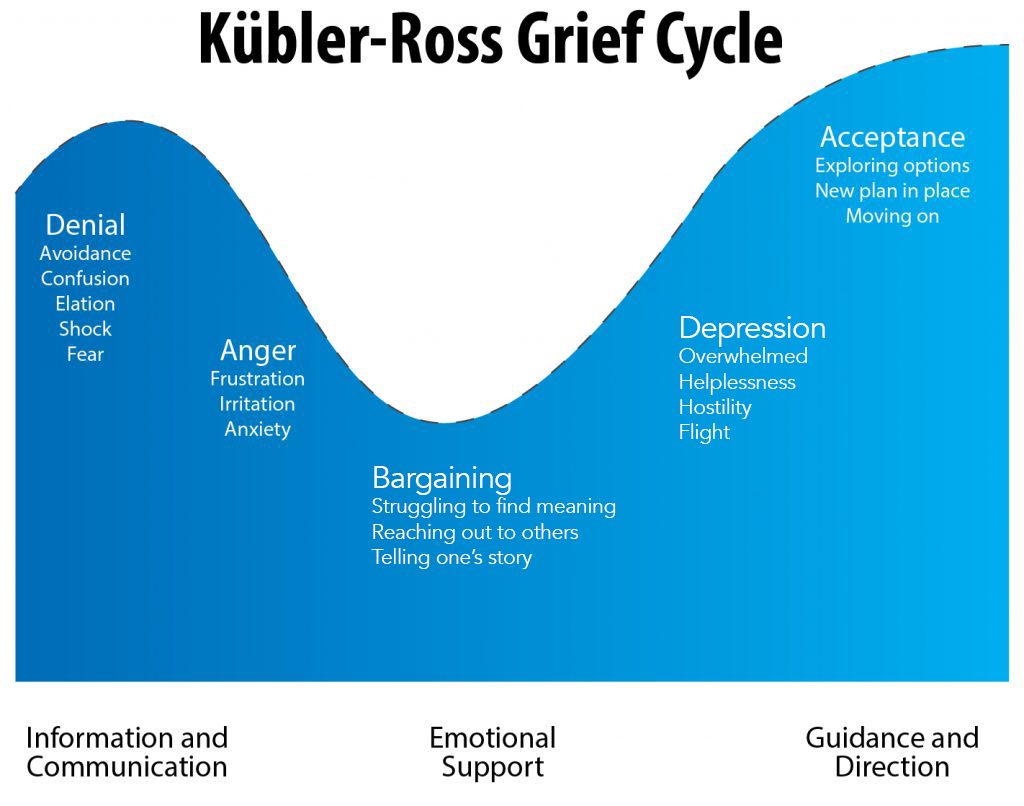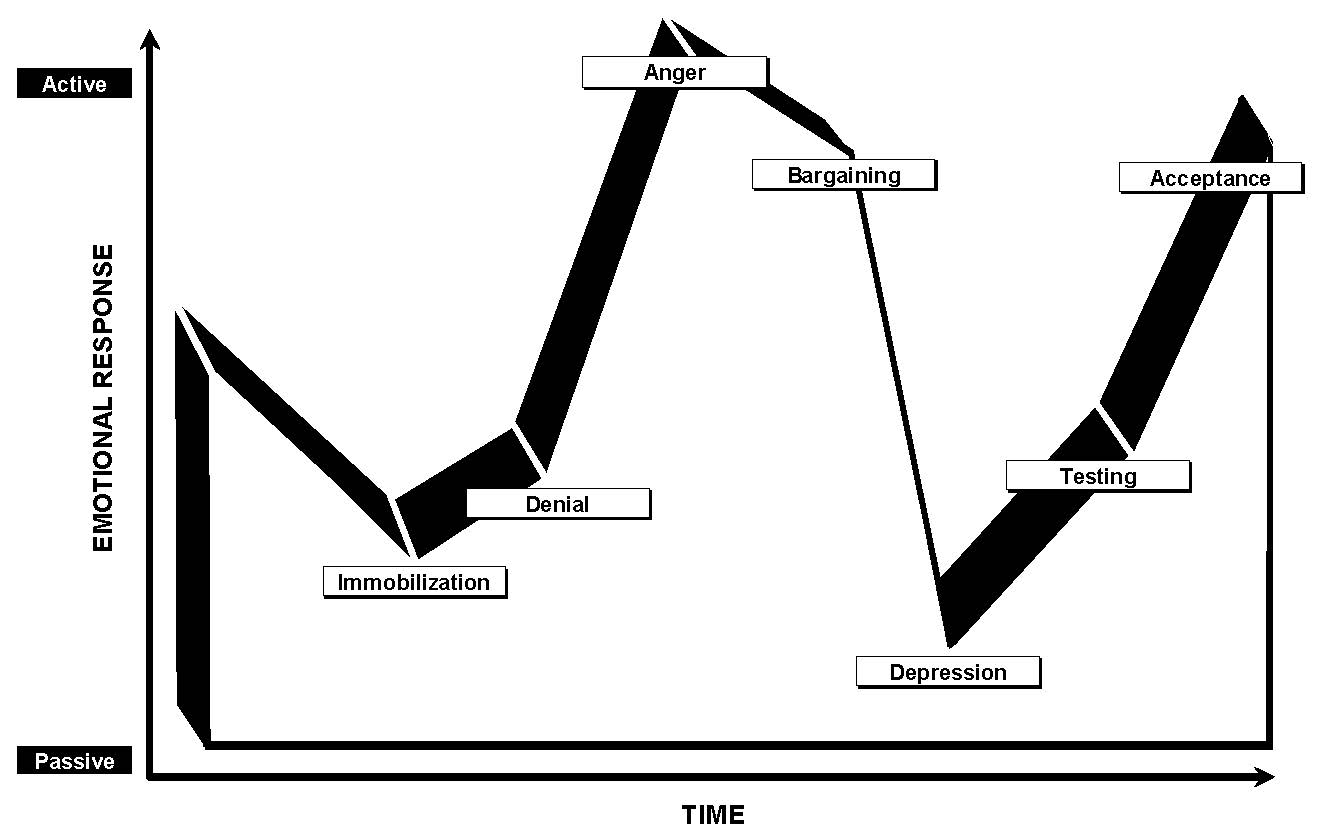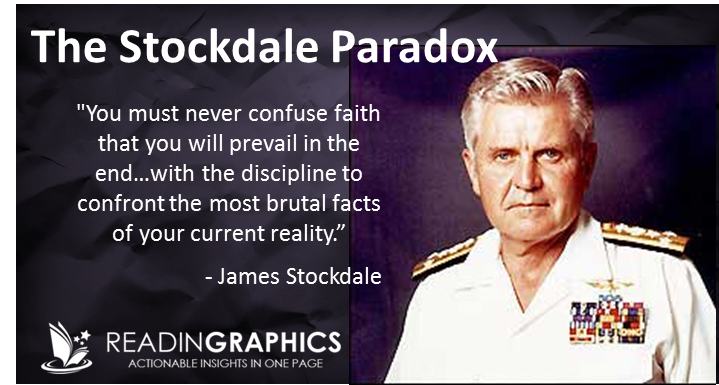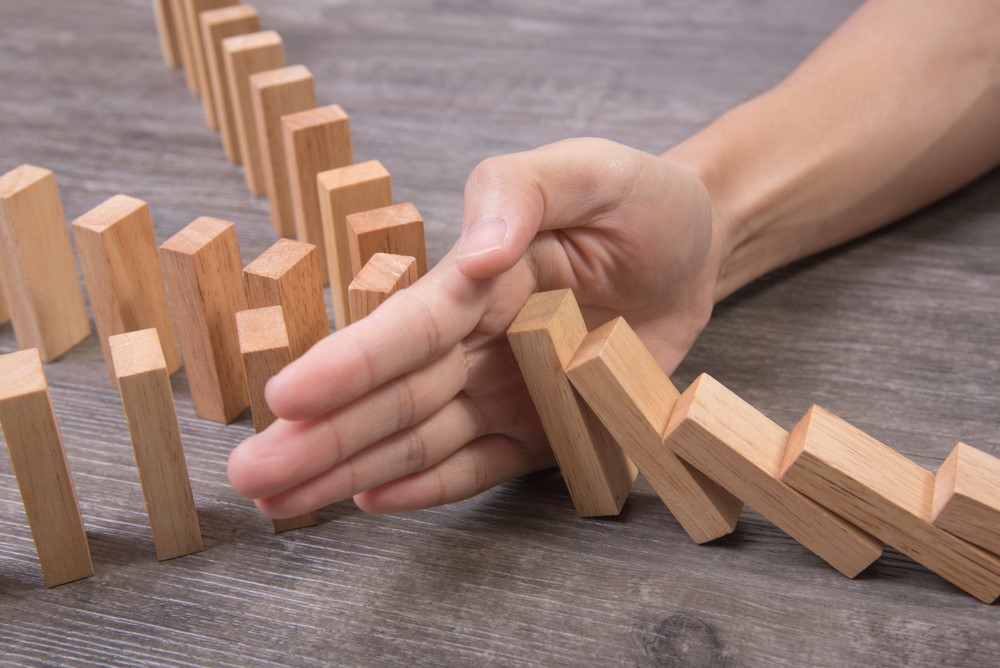How are you feeling?
I sincerely wish that you are able to read this because you are well, and because you are not preoccupied with one of your loved ones feeling sick. I hope that you and your loved ones continue to avoid staying clear of Covid-19.
So, since you and yours are hopefully healthy, how are you feeling? This pandemic is a big deal, isn’t it?
I am not sure how describe these emotions for myself, but I know I feel jittery and go from hopeful to pessimistic, then back, and then forth again. More recently, in the past week, I have started to feel more and more just basically ‘bummed out’, with some irritability thrown in.
People have said to me, they think that because I am in organizational change management changes don’t impact me the same way. I wish.
The reality is that I go through the same emotional process as everyone else when I am confronted with a major change or shock, and this pandemic is a great example. The only difference is that I have a bit more awareness of what I am experiencing as I go through these changes than most people in other professions would. It doesn’t change how I feel, but it takes the edge off, it does help me feel better. And so I wanted to share this blog so that you too can do the same and hopefully feel a bit better.
How would you describe what you’re experiencing? Confusion, mixed with anxiety? Feeling stressed with a sense of dread? Is it outright fear, maybe even with a sense of panic? Or maybe you are one of those individuals who is in control, calm on the outside, but now are uncharacteristically unsure deep down inside, like being in the eye of a hurricane?
However you want to describe it, it probably doesn’t feel great. So here is what you can do to make yourself feel a little better. Since the topic is serious, let’s have a bit of fun with it.
What I would like to introduce you to is change management self-jiu-jitsu.  And like all martial arts founded on Buddhist philosophy, this too relies on deep thinking and profound understanding. There are four levels of understanding that you need.
And like all martial arts founded on Buddhist philosophy, this too relies on deep thinking and profound understanding. There are four levels of understanding that you need.
Or perhaps like Yoda might say, “Four levels of understanding, you must have.”
Ready? Here is the first:
One: Understand that how you feel right now is absolutely normal
 In 1969 Elizabeth Kübler-Ross wrote the ground-breaking book On Death and Dying and was the first to document the emotional stages people go through when confronted by their own imminent mortality. These stages were documented in her “Five Stages of Grief Cycle”, illustrating a human being’s pattern of adjustment to the inevitable.
In 1969 Elizabeth Kübler-Ross wrote the ground-breaking book On Death and Dying and was the first to document the emotional stages people go through when confronted by their own imminent mortality. These stages were documented in her “Five Stages of Grief Cycle”, illustrating a human being’s pattern of adjustment to the inevitable.
I suspect you are familiar with this emotional change curve, or whatever you are used to calling it. However, there are some things you may not be aware of that happened as a result since Kübler-Ross published the book and her findings.
Perhaps most importantly, Kübler-Ross became a pioneer in palliative care and developed the modern palliative care framework. If you had the tragic experience of having a loved one go through palliative care, in addition to thanking the staff there, offer a thanks to Dr. Kübler-Ross. Without her your loved one likely wouldn’t have received the wonderful and compassionate care they did.
Also, her insights were expanded more broadly as psychologists and psychiatrists noticed these stages applied to other forms of trauma as well as lesser, but still significant, emotional shocks. For example, in my own field of organizational change management, I was introduced to the “Change Curve” through Daryl Conner’s influential book Managing at the Speed of Change.
The resemblance is striking and obviously not accidental. I have found the Change Curve to be a valuable tool in helping people in organizations going through change. Just by understanding what is happening to them people are better able to cope with their emotions in a more calm and reasoned way.
There will always be haters, as the saying goes. So, another thing that has happened is some criticism of the Five Stages of Grief Cycle. The bulk of the critiques can be summed up by, “People don’t go through those phases in such an orderly manner.”
This is true, but still doesn’t invalidate it. Besides, Dr. Kübler-Ross points this out in her book as well. All of us proceed through those stages when impacted by a significant event, but in a messy way, bouncing back and forth a bit. It’s the proverbial “two steps forward, one step back”. After all, we are not robots engineered to go through emotional processes according to some computer algorithm. We’re human. We are messy.
So how does all of this help you personally? Well, the feelings I described in the beginning closely resemble those in the first stage, Denial. The end of the Denial stage is marked by a sense of despondency and hopelessness. Although that sounds bad, it isn’t. What this is, is just reality kicking the bejeezus out of your false hopes. And that’s necessary for moving on.
Being hopeful is usually a good thing, but not here, not when you’re in denial. It’s the false hope of something external happening to change this painful sequence of events. The hope of some miracle out there, some superman or woman, maybe dressed in a white lab coat, coming to save us all. Who doesn’t like a Hollywood ending, right? Reality, that’s who.
“There will be a cure shortly, probably just a few weeks away.” No, there won’t.
“We’ll have a vaccine ready by the summer.” No, we won’t.
“This is like the flu.” No, it definitely isn’t.
“The economy will rebound quickly, and we’ll have a V-shaped recovery.” Well, go ahead, you answer this one yourself.
The main point here is, as negative all of this sounds, the way you are feeling is absolutely normal. So, at least you shouldn’t feel bad about feeling bad. Don’t beat yourself up. It’s important to understand this and not put additional pressure on yourself.
Two: Understand that almost everyone feels the way you do right now
What’s better than feeling lousy and alone? Feeling lousy together! And, many of us are feeling lousy right now. “Misery loves company”, as the old saying goes.
Feeling miserable goes hand in hand with feeling alone and isolated. We’re not motivated to share our bad feelings the way we are energized to share our happy ones. We share jokes with friends gladly, and we joyfully forward them when we get them (depending on our individual tastes).
But I have not yet seen someone share depressing tragedies, at least not in the same enthusiastic way. Can you imagine? “Hey guys, get this! My daughter’s kitten just got splotched by a truck! Wow, you should have seen it – I can’t stop weeping. I’ll send you the video l8r.” It doesn’t work.
A reason we don’t share our low moods is that we feel others don’t want to hear them. And in some way, there is truth to that. Sadness doesn’t sell as well as happiness does. “The Hills are Alive With the Sound of Mourning”, just doesn’t have the same ring to it, does it? That movie probably wouldn’t have made much money at the box office. How about “Sobbin’ in the Rain”? Or, “Ferris Bueller’s Day in a Coma”?
However, you could also be wrong. Maybe people do want to hear about your bad feelings. That is especially true if they are feeling bad as well. If you are feeling scared that you might lose your job, for example, and one of your work colleagues confides in you that they are also afraid of losing theirs, suddenly you feel a bit better. “OK, good, it’s not just me!”
There is comfort in numbers. And right now the numbers are huge, and they’re global. Right now you could probably just take your phone, pick any number, in any country in the world, and just blurt out, “This pandemic really has me scared.” And they will likely say with a sigh of relief, “Yeah, me too!” And then they might say, “Who is this?” and “Where are you calling me from?”
So as bad as you are feeling right now, understand that many, many people all over the world are feeling at least as bad as you are.
Three: Understand the ‘Why’ and the Benefits of you feeling this way
How can feeling ‘bad’ be ‘good’? A good friend and counsellor of mine, Allan Sheps of the Toronto Institute of Group Studies, once introduced me to a book which had a quote that seared itself into my mind:
“All feelings are meant to be enjoyed.”
Yes, that means even the bad ones. Unfortunately I don’t remember the name of the book any more, but I have never forgotten that phrase.
Speaking of self-jiu-jitsu, reading that at that time felt like I just flipped myself over and landed hard on my back, gasping for breath. How are you supposed to enjoy bad feelings? I’m still not sure, but I learned that by actually trying to enjoy them made me stop trying to get rid of them. And by letting them just be, it took pressure off of me to use the little energy I had at the time on something futile anyway.
It was better to use whatever little strength I had to figure out why I felt that way in the first place, and deal with that. Let’s now do that with Denial.
What’s the point of this confusing, debilitating emotion? I mean, there is not much you can do in that state. What is the evolutionary advantage of that? Yet, it must have some evolutionary advantage otherwise it would not exist nor be so prevalent.
Here’s an answer. Denial forcefully interrupts you from doing what you’re currently doing, from thinking what you’re presently thinking. It interrupts your routine because this big, new event is far more important to you than your daily habits. Consciously you may not realize that yet, but your mind is telling you. You are facing an existential threat, or at least a threat to your status, way of living, or something else very important to you. The denial stage a hard stop of your status quo.
And now your mind is forced to reprioritize everything. You have to re-plan your plans. You may need to change direction. You’re like a tanker in the open seas needing to change course because of a major threat up ahead. First you need to cut the engines and slow right down. And then figure things out.
That makes sense, doesn’t it? What’s more important to an investor right now, for example – how their stock portfolio is doing, or whether they might end up on a ventilator and possibly not live to collect?
So, take heart. You may not be feeling great right now, but there is a very, very good reason for you feeling this way. Understanding that is important to letting go and accepting these feelings.
Four: Understand how to process Denial
Even after all of these levels of understanding, you may still feel like that’s not enough. We humans are designed for action. It makes us feel useful, in control, vital. So what action can you take?
First the bad news. You shouldn’t take a lot of action right now. This is the time to slow down and think, evaluate, assess. You should definitely avoid making major decisions right now. Most big decisions you may be considering will be rash decisions. Most of us right now are not in a calm and rational state, the best state from which to do this. It’s actually just the opposite.
Now the good news. You can work on keeping a high state of mental health, and not let the feelings that are part of the Denial stage drag you down too far. Here is a link to a good video that has some very helpful suggestions.
You can also work on these four levels of understanding, and accepting where you are right now. That will free you from waiting for an external actor to come to your aid, and will empower you to take control of what is within your sphere of influence.
 One of my subscribers, Tim Regan of Career Constructors, recently sent me an email that included reference to “The Stockdale Paradox”. I read about that in Jim Collin’s book From Good to Great, and Tim’s email was a good reminder. As Tim wrote to me in his email:
One of my subscribers, Tim Regan of Career Constructors, recently sent me an email that included reference to “The Stockdale Paradox”. I read about that in Jim Collin’s book From Good to Great, and Tim’s email was a good reminder. As Tim wrote to me in his email:
“James Stockdale was a senior naval officer who was held as a POW (prisoner of war) during the Vietnam War; he was held captive for over seven years.
The gist of his lesson (as I recall from Good to Great) was that the POW’s who survived their captivity in best mental shape were those who absolutely held firm to the idea that they WOULD be freed some day, but at the same time NEVER gave in to false hopes of their release being imminent.
By contrast, the POW’s who were broken by the experience were those who continually grasped onto artificial dates and deadlines for when they would see freedom. “We’ll be out by Christmas…” became “We’ll be freed before Easter…” became one unfulfilled arbitrary deadline after another, and ultimately broke their spirits.”
In essence, those who survived were able to let go of Denial. It’s important for all of us to do that too. Understanding this is important to being able to move to the next stage.
Where to from here?
At the beginning of the blog I asked whether some of you were starting to feel irritable, something I am starting to feel more and more. That’s the start of the Anger stage.
The Anger stage is very important because this is where you can start to lay the groundwork for your own personal positive re-set. But it is also a tricky stage because if not handled properly it can set you back for a very long time.
But again, as Yoda would say, “Write about that, in the next blog I will”.
I hope you feel a little better. Let me know what impact this had on you.
Let us know what you think – Contact us!
Like this blog? Share it with your colleagues. And sign up so you won’t miss another one!












